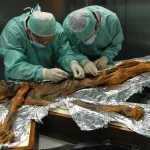The Unexpected Supper: A Night of Solace in Rome

Related Videos:
The siren’s wail usually signified distress, urgency, perhaps even danger, slicing through the ancient Roman night. But on this particular evening, in a quiet, unassuming apartment building tucked away in the Trastevere district, the distant sound held a different kind of meaning for Jole, 84, and her husband, Michele, 94. For them, it was a lifeline, a desperate plea whispered into the void of their overwhelming solitude.

It had been weeks, perhaps months, since the last friendly face had graced their small, time-worn living room. Their children, busy with their own lives in distant cities, called less and less frequently. Friends had passed on, or were too frail to visit. The world, it seemed, had slowly forgotten them, leaving them marooned on a tiny island of silence.
On this particular night, the silence had become a physical weight, pressing down on Jole’s chest until she could barely breathe. Michele, usually stoic, sat staring blankly at the flickering television screen, where news of the bustling world played out, a stark contrast to their stagnant reality. A wave of profound loneliness, cold and sharp, washed over them both.

“Michele,” Jole’s voice was thin, reedy, barely a whisper. “I… I can’t bear it tonight.”
Michele turned, his eyes, though clouded by age, held a flicker of understanding. He reached for her hand, his skin papery and cool. “What can we do, cara?”
Jole, on an impulse born of sheer desperation, reached for the old rotary phone. Her fingers, gnarled with arthritis, fumbled with the dial. She wasn’t calling a neighbor; there were none left they knew well. She wasn’t calling family; they wouldn’t understand. She dialed 112, the Carabinieri, Italy’s national police force.
A calm, professional voice answered. “Carabinieri, pronto?”
Jole hesitated, her heart pounding. “Yes… hello,” she stammered. “This is Jole, Jole D’Amico. My husband and I… we are old. We are very, very alone. We… we have no one to talk to. Can you… can you just… come?”
There was a moment of silence on the other end, a pause as the dispatcher processed this most unusual of calls. But instead of dismissal, there was empathy. “Signora D’Amico, we will send someone right away.”
Twenty minutes later, the heavy knock on their apartment door startled them. Michele slowly opened it to reveal two young Carabinieri officers in their crisp uniforms. Andrea and Vincenzo. They looked stern, official, but their eyes held a softness that immediately put Jole at ease.

“Signora D’Amico? Signor D’Amico?” Andrea began, his voice gentle. “You called?”
Jole nodded, tears welling up. “Yes. We… we are so sorry to bother you. But we just felt so alone.”
The officers stepped inside, taking in the spotless but quiet apartment, the framed photos of a younger, vibrant couple, the untouched plates on the small kitchen table. This wasn’t a crime scene; it was a scene of quiet human need.
Andrea glanced at Vincenzo, a silent communication passing between them. They had seen many things in their patrols, but this touched a different chord.
“No bother at all, Signora,” Vincenzo replied, a warm smile spreading across his face. “In fact, we were just thinking… we haven’t had dinner yet. Do you two mind if we join you?”
Jole and Michele exchanged a look of utter surprise, then dawning hope. “Join us? But… but we haven’t prepared anything.”
“Nonsense!” Andrea declared, striding towards the small kitchen. Action Begins: He expertly opened a cupboard, his gaze scanning for ingredients. “What do we have here? Pasta? Tomatoes? Onions? Perfetto! A Roman classic!”

Vincenzo, equally at ease, began setting the table, finding extra plates and cutlery. “Signora, Signor, please, you rest. Let us take care of this.”
The Scene Unfolds: The small kitchen, usually echoing with silence, suddenly came alive with the sounds of activity. Andrea, with surprising domesticity, began to chop onions with a practiced hand, the rhythmic thud-thud-thud of the knife a comforting melody. Vincenzo moved about, fetching pots and pans, the clatter of metal against ceramic filling the air. The aroma of garlic and sautéed onions soon began to waft through the apartment, a scent that Jole and Michele hadn’t experienced in their own home for what felt like an eternity.
Jole watched, mesmerized, from her armchair. “You… you cook?” she asked, a tentative smile gracing her lips.
Andrea winked. “A little, Signora. My nonna taught me well. Every Carabinieri learns to be resourceful!”
Michele, who had been sitting hunched, slowly straightened up. He watched the young men, their uniforms a stark contrast to their gentle actions. He hadn’t expected this. He hadn’t dared to hope for it.
As the pasta boiled and the simple tomato sauce simmered, the officers didn’t just cook; they talked. They asked about Jole and Michele’s lives, their memories of Rome, their stories of a bygone era. They listened with genuine interest, not the polite, distant attention of hurried visitors, but the engaged warmth of friends.

Finally, the meal was ready. A steaming plate of spaghetti al pomodoro was placed before each of them. It was a simple dish, but to Jole and Michele, it tasted like a feast.
” Buon appetito! ” Andrea and Vincenzo said in unison, raising their forks.
The four of them ate, sharing easy conversation and laughter. Jole recounted stories of her youth, of dancing in the piazzas. Michele spoke of his work as a tailor, of the changing face of Rome. The officers, in turn, shared lighthearted anecdotes from their day, their jobs, their own families.
The photo captured a fleeting moment of this unexpected evening: the two officers, still in uniform, one stirring a pot, the other reaching for a serving spoon, their faces focused on the simple task of preparing food. Jole and Michele sat at their small table, their expressions a mix of wonder and quiet joy, no longer solitary figures in their silent home, but participants in a shared, human moment.
When it was time for Andrea and Vincenzo to leave, hours later, the apartment felt different. The silence had not vanished, but it had been softened, imprinted with warmth and connection. Jole and Michele stood at the door, waving goodbye, their eyes bright with a renewed spark.
“Thank you,” Jole whispered, her voice thick with emotion. “Thank you for everything.”

Vincenzo smiled, gently squeezing Michele’s shoulder. “It was our pleasure, Signora, Signor. Any time you need us, you call. But next time,” he added playfully, “we’ll expect you to make the sauce!”
As the officers disappeared down the hallway, their footsteps fading, Jole and Michele closed the door. The apartment was quiet again, but it was a different kind of quiet. It was a quiet filled with echoes of laughter, the lingering scent of garlic and tomatoes, and the profound, comforting knowledge that even in the vastness of an ancient city, humanity still found a way to connect, to nourish, and to heal the quiet ache of loneliness.











